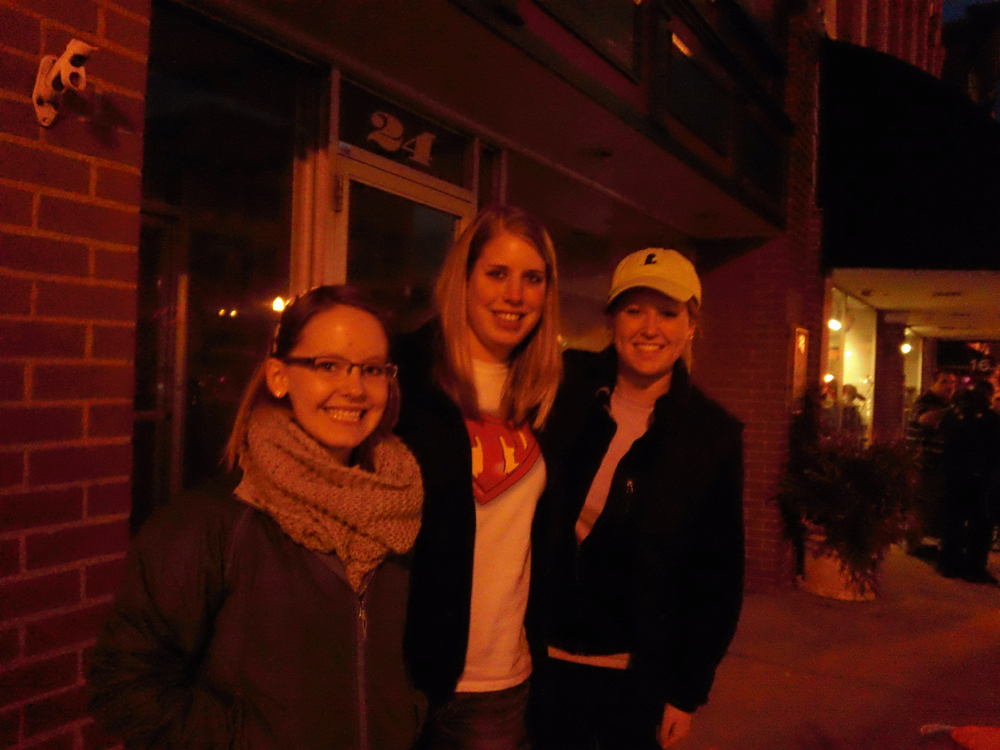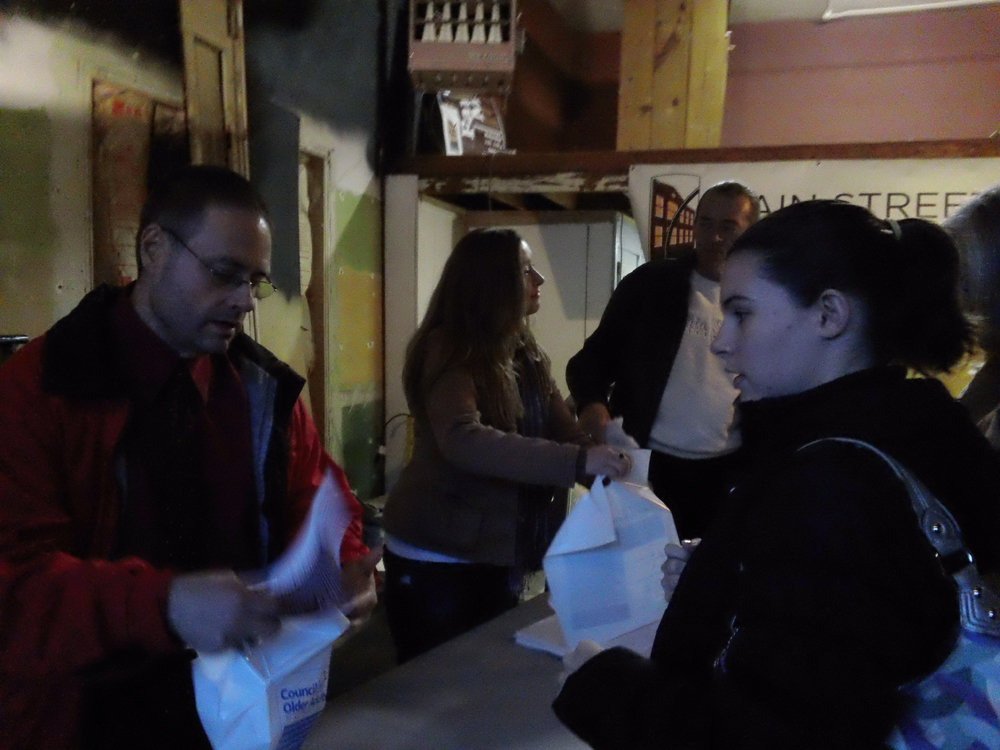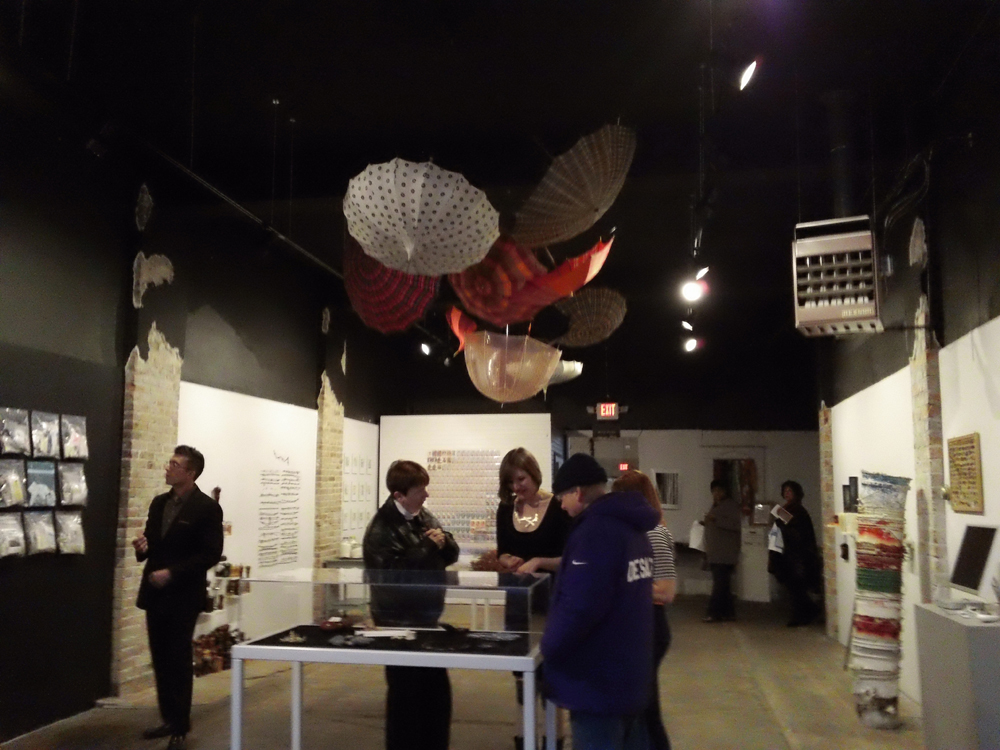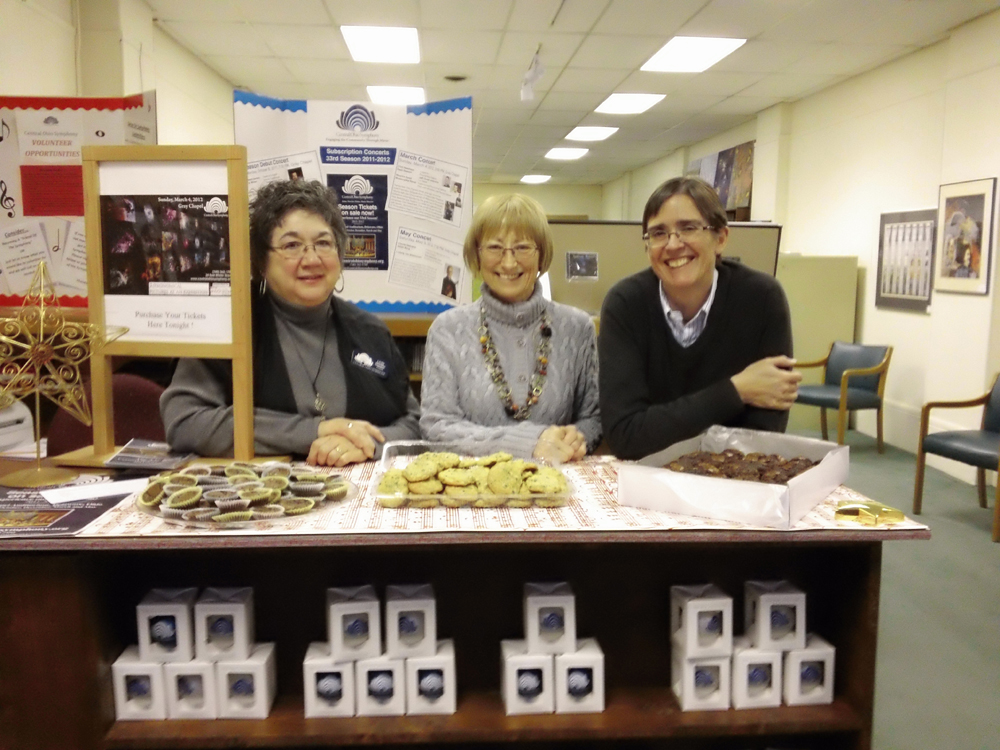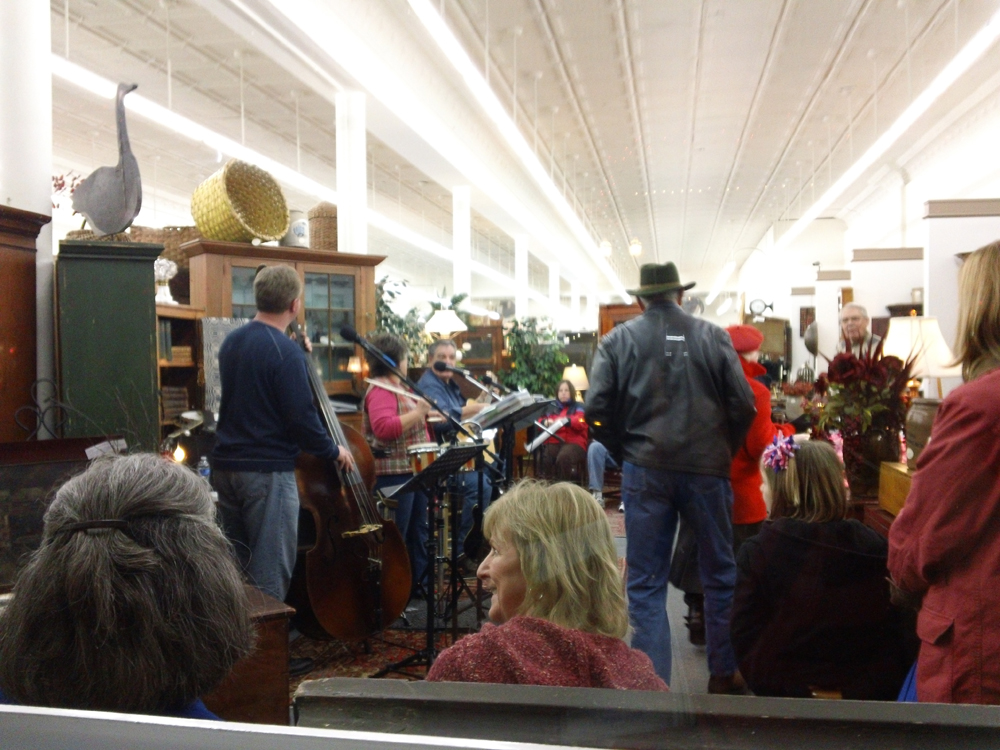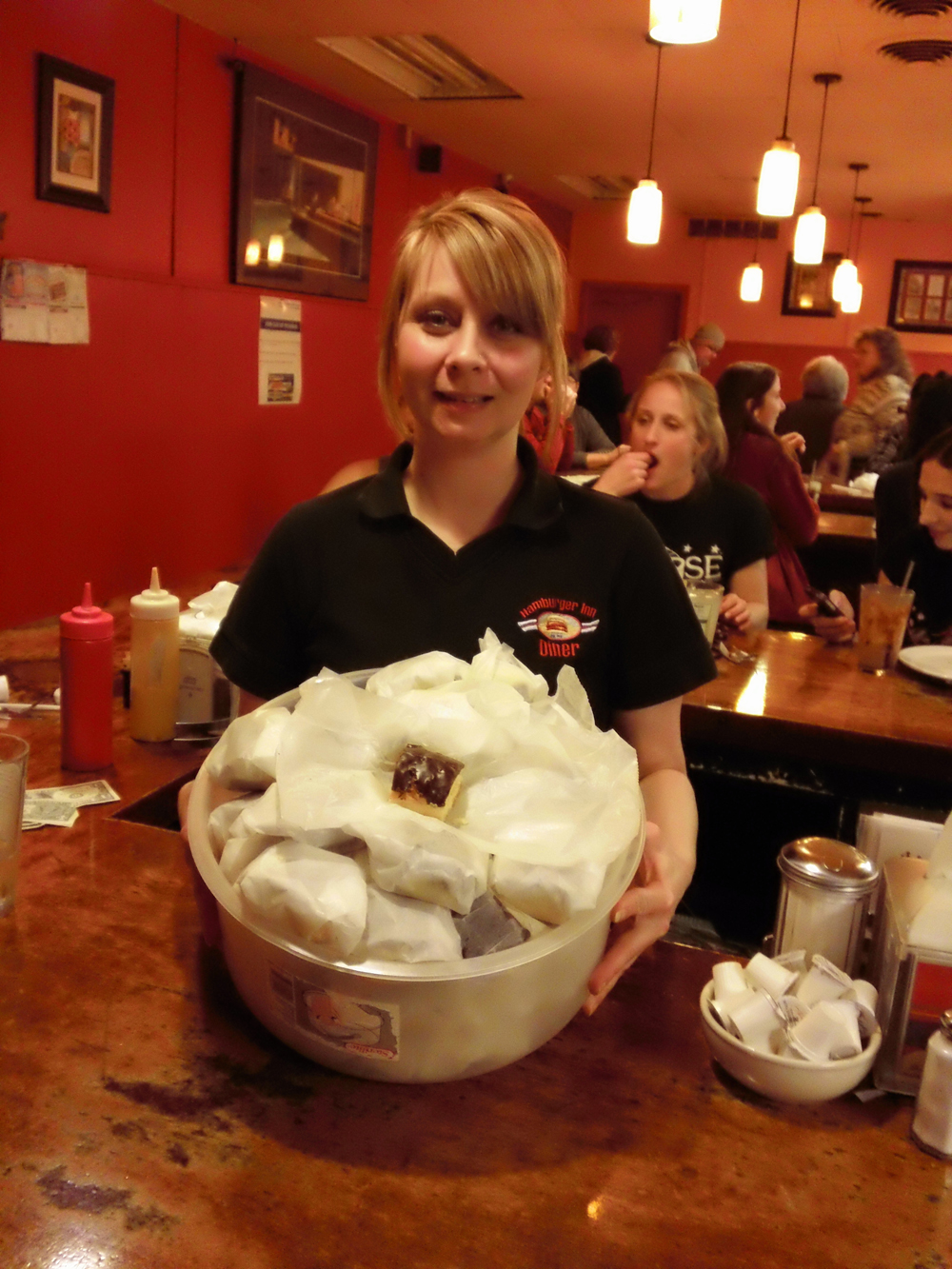Last week each of the eight Small Living Units (SLUs) applied for renewal to return to campus as living options next school year.
SLUs are required to reapply for their house through the renewal process, which includes an application and a roster for the following year.
SLUs must also give a presentation about their mission statement and importance to the Ohio Wesleyan and Delaware communities to a panel comprised of faculty, Public Safety officers and students.
If a SLU makes changes to its mission statement, it must explain why such amendments are necessary.
These presentations took place on Friday, Feb. 10 from 1-4 p.m.
Junior Paige Ruppel said the renewal process is necessary because the presence of SLUs on campus is beneficial not only to those students in SLUs, but also to the entire OWU community.
“We account for a lot of the student programming that goes on (on campus),” Ruppel said. “Each house member must put on a program each semester as a requirement to live in the house, and with so many projects on campus, SLUs address a broad range of issues. With eight houses on campus, most everyone can find a cause of interest to them.”
Sophomore Martin Clark, secretary of WCSA, agreed with Ruppel on that idea.
“I feel that the SLU community is a great asset to the campus,” Clark said. “It delivers a valuable living experience separate from the fraternities or dorms. The SLUs hold many events throughout the year that help facilitate important conversation about various topics throughout different social groups on campus.”
Although enrollment is down, members of both SLUs and WCSA are not worried about the SLUs ever being unavailable as a living option.
Freshman Lauren Holler, a WCSA class representative, said if there is any debate over the necessity of SLUs on campus, she’s “never heard anything negative about (the SLUs).”
“SLU living is not for everyone, but some students really enjoy the concept of living in themed houses,” said Holler. “Wesleyan Council on Student Affairs believes that SLUs are an integral part of residential life at Ohio Wesleyan.”
Ruppel said she is not worried about the SLUs going anywhere.
“I think that the entire campus, including administration, realizes how valuable the SLUs are, so if there is any opposition, I have not noticed it.”
Category: News
New WCSA officers work to trim fiscal fat
The accession of a new Wesleyan Council on Student Affairs executive body has brought several changes to the organization’s budgetary process in an effort to make it more efficient.
A primary instrument in this has been the installation of new software that allows WCSA Treasurer Marshall Morris to see in real time how much money is in the account of each individual student organization.
According to Morris, the treasurer and budget committee were not previously privy to this information. Requests to see an account balance for any organization was “all done by paper,” a process that took two days.
“Many of the budget requests that came before the committee were kind of allocated in the dark, not knowing how much money the club actually had,” Morris said.
The program was headed in part by the Financial Affairs office. According to Eric Algoe, vice-president for finance and administration, it was installed in the summer but there were some difficulties with its operation in the fall semester.
“There was a period of time in the fall when the accounts were not easily available online while we were implementing our new systems, but the accounting staff of the university met with the WCSA treasurer during that time to provide as much support as possible in making their initial allocations,” he said.
Morris said the software has made his job as treasurer easier overall.
“I really do like it,” he said. “I think it provides a more clear understanding of what the status of each club is. That protects us from over-allocating money to them.”
Morris also said he has experienced some difficulties with the program. Despite being able to view balances for individual organizations, he and the budget committee does not have permission to see how much money is in the aggregate WCSA account.
WCSA’s budget comes from the student activity fee, a flat rate of $110 paid by all students each semester; the budget committee can therefore make a rough estimate of the balance of the WCSA account by multiplying the number of currently enrolled students by 110. Morris said while this is helpful, he’d like the ability to know the exact amount of money he and the committee have to work with.
According to Morris, deciding balances he is allowed to see is entirely up to the administration.
“This was something so far above any student organization,” he said. “The students really didn’t have a say, but this is something they thought would help maintain accounts on their level. They have so many more accounts and stuff than I do. I was just granted one little sliver to help better accurately fund organizations.”
Algoe said the administration has “exercised almost no influence or control” over the WCSA account, only handling money transfers and ensuring “nothing illegal happens with the funds.” He was unaware the lack of permissions would be an issue for the budget committee since “the amount is very straightforward,” but it would be an easy problem to fix.
“It’s as simple as us adding one more line to the permissions of what they [the committee] can view using the online tool,” he said.
He added that there are some idiosyncrasies with the aggregate account at the beginning of the year, so the committee would need to be prudent in its actions during that time.
“The one thing we will need to work with the treasurer to understand is that the amount will fluctuate during the first few weeks of each semester as students enroll late or withdraw and have their fees refunded,” he said, “so it will be important to hold back around 10 percent from the initial allocation until the dust settles, so to speak.”
Furthering his efforts to make WCSA more “fiscally responsible,” Morris has also redesigned the budget request form student organizations use to solicit funds.
The new form requires an itemized list of each specific expense needed for any event or program. Instead of listing broad categories such as “transportation” or “lodging,” organizations must now determine how much money they need for each item within those groups.
“That’s what we need as budget committee to more effectively and accurately allocate funds to the club or organization,” Morris said.
According to Morris, the new form is “much more streamlined.”
“The previous one had a lot of things to get lost in,” he said. “This is the bare bones of what we need, and we only want the information we need.”
The committee recently granted People Regarding Individual Diversity Everywhere $3,000 to fund a trip to the Midwest Bisexual, Lesbian, Gay, Transgender and Ally College Conference from Feb. 10-12.
PRIDE President Anthony Peddle said he thought the new form made the request process easier.
“It helped us a lot to make sure we allotted enough for each specific thing,” he said.
Sam DeJarnett, vice-president of the Student Union on Black Awareness, disagreed.
“It’s very tedious,” DeJarnett said. “If you’ve never done it before it can be confusing.”
The budget committee recently granted SUBA and Sisters United $3,400 to fund a Feb. 25 event titled “Death of the Diva,” which the two organizations are hosting in conjunction with the Women’s House; the House of Black Culture; Black Men of the Future; and the women’s and gender studies and theatre and dance departments.
“Basically, you have to leave no stone unturned,” said Alexis Williams, former Sisters United vice-president.
In addition to the form, organizations wanting WCSA money must make a presentation of their request before the budget committee to decide if they will recieve funding.
Morris said the primary purpose of the presentations is to thoroughly inform the committee about what it will be funding.
“If we’re unclear on something, instead of granting them zero dollars we’ll ask them to come back,” he said.
Peddle said his presentation was casual and easy.
“We just presented the basic conference necessities, what we want[ed] to do at this conference and what we hope[d] to gain from it,” Peddle said. “It was just an informal conversation so they could learn more about it and make a better-educated decision.”
DeJarnett said her recent presentation for “Death of the Diva” went smoothly, but she has experienced difficulty with procuring funds in the past, especially with regard to SUBA’s annual Step Show.
“Since the beginning of Step Show there’s always been some difficulty,” Dejamett said. “I don’t know whether it’s the concept that’s difficult to grasp or just the allocation of funds in general, but there’s always some miscommunication. I find it weird that it was easy to get $3,400 from WCSA, but these organizations [SUBA, HBC, Sisters United, BMF] struggle all the time.”
In addition to ad hoc presentations for specific events, student organizations are now required to make annual funding presentations each semester, a process previously undertaken only once a year.
Peddle said these proffers do not require the specificity of those for single events.
“The ad hoc budgets are more specific and itemized, whereas the general budgets are more generalized and overviews of events,” Peddle said.
Morris said the committee uses the annual allocations they offer to organizations as a guide when hearing ad hoc proposals.
“If a club is consistently only doing supplemental funding, then we’re like, ‘This club’s not really on the ball,’” he said.
Weekly Public Safety Reports, 2/7/12 – 2/11/2012
–On Feb. 7, at 11:15 p.m., PS officers were dispatched to Thomson Hall on a welfare concern. The student was transported to Grady Hospital by Delaware EMS.
–On Feb. 8, at 11:45 p.m. Sigma Phi Epsilon fraternity was referred to student conduct for an unregistered party following a routine safety check
by Public Safety officers.
–On Feb. 8, 11:58 p.m., an OWU student was referred to student conduct for alcohol prohibition.
–On Feb. 9, 7:36 p.m., Public Safety officers were dispatched to Stuyvesant Hall on a report of several individuals attempting to push the porta-toilet over. Upon arrival the perpetrators had left the scene after knocking the portable toilet over. Investigation is ongoing.
–On Feb. 10 at 4:45 p.m., Public Safety dispatched to 20 Williams Drive on a welfare concern. Emergency transport was not required.
–On Feb. 10, at 11:10 p.m. a Bashford Hall resident was charged with possession of marijuana and drug paraphernalia.
–On Feb. 10, 11:40 p.m., two Bashford Hall residents were referred to student conduct for alcohol prohibition.
–On Feb. 11, at 2:10 a.m., Public Safety and Delaware City Police responded to a security alarm at the Beeghly library. There were no signs of forced entry. A search of the premises failed to locate the cause of the alarm.
Teammates forget the past and press full court
Freshman Mary Corbett and Sarah McQuade were once rivals but now work together on the Ohio Wesleyan Women’s Basketball team.
Corbett and McQuade went to competing High Schools in Ohio and the two became known for their rivalry due to their similar skill set, age, and talent.
Corbett and McQuade first met their junior year of High School at a basketball program where the two, much to spectator’s surprise, became close friends.
“At first it was awkward because we knew who each other were but we became best friends after playing with each other,” Corbett said, “She is a reason I came to Ohio Wesleyan because I knew we both came from successful high school teams where we both had been very well coached and I liked the idea of being on the same team as her.”
McQuade echoed Corbett’s thoughts and feel the two work very well together.
“I think it makes us play better together because we both know each other’s strength and weaknesses and what each other is going to do out on the court,” McQuade said, “Our rivalry in high school doesn’t affect us at all but to outsiders, I’m sure they think it’s funny to see us playing together.”
The Bishop’s are in somewhat of a transitional year, their assistant coach for the last four seasons, Stacey Reed, has now become their head coach and the young team is lead by mostly freshman and sophomores.
Freshman Caroline Welker, who was the top scorer in the team’s December 31 game against Wittenberg with 18 points, believes the team is constantly improving the way they work together.
“We have been continually improving throughout the season, but we have still have been struggling to bring it all together in one game,” Welker said.
McQuade believes the team’s task to replace three leading scorers from last year is happening at a steady rate.
“If you just looked at our record, most would say we’re having a down year but were growing together. There are four freshman starting and a sophomore so we are very young,” McQuade said.
Corbett also believes the team’s transitional phase will pay off going into the end of the season.
“I think our performance this year has not been a direct reflection of all the talent and potential we have as a team,” Corbett said, “We have gone through a lot this year as a team and I think our experience now will help us grow for the end of the season.”
The Bishop’s defeated Oberlin on Saturday 81-74 and their record currently is 8-13. The Bishops next home game is Wednesday against Wooster in the Branch Rickey Arena.
Students hopeful with dates after date auction
Rafiki Wa Afrika’s first Date Action raised auction prices skyward while overall funds were well beyond expectations.
All proceeds are going toward the Ghana Student Education Fund, an organization that looks to better the education of students in Ghana and allows brilliant and deserving children a chance at achieving their dreams.
Students gathered in the Hamilton-Williams Campus Center Atrium on Friday at lunchtime to watch their fellow classmates be auctioned off, and to have a chance to bid on someone. There were 17 students auctioned off; eight women and nine men.
The opening bid was $10, and the auctioned-off date would accompany the highest bidder to a fixed dinner at Bun’s Restaurant later that evening. There was plenty incentive to make a bid: all of the students being auctioned off were dressed to impress, lobster was on the menu and all the proceeds were going to a good cause.
Sophomore Sophie Kiendl attended the auction and had hopes of bidding on her fellow classmate and friend Dylan Porter. But when someone bid $70 on him Kiendl couldn’t offer any more money, explaining that Porter is a great guy, but he wasn’t worth that high a price.
Other students thought differentl
about shelling about large amounts of cash, especially sophomore Elizabeth Smith, who bid $300 on sophomore Danyal Omar.
Junior Jacqueline Osei-Bonsu, who led and ran the date auction, said that Smith was excited to donate the $300 because she cares so much about the Ghana Student Education Fund, and wanted to take Danyal out for a nice meal.
This was the first time Rafiki Wa Afrika has ever held the auction, so Osei-Bonsu anticipated running into a few organizational problems.
“It was really hard getting people together and trying to finalize things when we couldn’t reach people, but in the end it all came together,” she said.
Osei-Bonsu said that the main problems included finding a place for the students to have their date and rounding up the auctioneers. She said she was nervous that students wouldn’t bid, but was thrilled everyone was auctioned off, and the lowest bid was $20.
The total for all 17 students was $1075, with an average bid just above $60. This number was way above Rafiki Wa Afrika’s expectations.
The entire Rafiki Wa Afrika club was very excited about being able to donate $1075 to the Ghana Student Education Fund.
Sophomore Porter was asked if he would auction himself off for the cause, and he said he couldn’t say no.
“I’m always one for helping, and if my mere smile can help raise some money I’m totally in” said Porter. “I am a bit disappointed I wasn’t the highest bid, but hey I was nervous on stage and didn’t do questionable things like fellow auctioneer Pierre Freed did, like take my shirt off in efforts to raise more money. The dinner at Bun’s was quite the treat, and I got to meet new people. Overall I am happy I was able to contribute, and hope I can next year as well”.
Freshman Maria Urbina also auctioned herself off. She said she was originally nervous to go up on stage, but when two of her friends got into a bidding war, she said she was flattered.
Junior Chris Ostrowski ended up winning Urbina, but he was unable to take her on the date to Bun’s because he had a lacrosse game that night. Freshman Jane Suttmeier, a friend of Urbina, filled in for Ostrowski.
Suttmeier said although the atmosphere at Bun’s was a bit awkward between the other dates, she had a great time and was happy to see so many classmates participating in a great cause.
Because of the auction’s success, Osei-Bonsu and Rafiki Wa Afrika have plans of holding another next year.
“I feel the event went extremely well and I heard feedback from other people which helped in drawing my conclusion that it all turned out almost perfect and we just had to work on a few more things to make it perfect for next year,” said Osei-Bonsu.
Myths debunked during Siegfried lecture: Eating disorders are topic of discussion to promote treatment
Nicole Siegfried, an eating disorder lecturer, urged students to not fall prey to myths concerning eating disorders during her Feb. 9 lecture. Siegfried’s lecture was part of the Food Course Connection.
Assistant professors of Psychology, Vicki DiLillo and Jennifer Yates, hosted the lecture.
“[The] food course connection is one of those interdisciplinary course connections that is trying to look at a specific theme or topic from a variety of different disciplinary perspectives,” DiLillo said. “We thought that having someone who could come in and talk about eating disorders would be of interest to students and would be potentially helpful to them.”
Siegfried’s lecture dealt with myths behind eating disorders, such as eating disorders are effective weight management.
“The truth is, disordered eating such as restricting, vomiting, (or) laxative use are not only dangerous, but are not effective measures for weight loss,” Siegfried said during her lecture.
“In fact, a majority of individuals… who go on diets or severe diets gain their weight back and then some.”
Other myths included the modern adage that says most college freshmen gain 15 pounds.
“This is actually a myth,” Siegfried said. “It makes it more likely that [college freshmen] might set the stage for restrictive eating.”
Siegfried said half of freshmen will gain weight and another half will lose. However, the difference between them is only five pounds.
Siegfried, who works at a treatment facility for those who suffer from eating disorders, speaks at many events, both in her area and at national conferences.
“I really want to help educate especially college students on what eating disorders are, understanding how to identify them either in themselves or their friends and how best be able to approach someone who has an eating disorder to help get them the help they need,” Siegfried said before the lecture.
Senior Ane Shoemaker was one of many students to attend the lecture.
“I have had an eating disorder in the past, and so I’m interested in seeing more modern information on it and just being updated on that information,” Shoemaker said. “Some of the myths were surprising to me.”
Siegfried mentioned many ways to help loved ones who may have/have an eating disorder. Siegfried also mentioned that using phrases like, “You look too thin,” should be avoided, since that may send the message whatever disordered eating is being practiced is working
Shoemaker had advice to those who may be approached about having an eating disorder.
“Be open,” Shoemaker said. “If someone approaches you; they’re really trying to help you. They care about you, they’re not trying to bring you down. They’re worried about your survival. They don’t want you to get hurt or fall prey to this more than you already are.”
Tips to help those with eating disorders:
– Set a time to talk.
– Communicate your concerns
– Ask your friend to explore these concerns
– Avoid conflicts or a battle of the wills
– Avoid placing shame, blame or guilt
– Avoid giving simple solutions
– Express your continued support
Students want changes in dining
Bishops can expect several new dining alternatives on campus beginning next year, as WCSA and Chartwells work to expand options.
According to junior Anthony McGuire, WCSA President, students and staff can expect extensive changes to campus dining.
“They want to expand the food court in Ham-Wil, add a fourth register, and put in a salad bar,” McGuire said. “They’re also planning to bring in new options like Papa John’s,” he said.
Other projects include expanding the Thomson store to almost twice its current size. This expansion would be done by building outward into the current lobby area in front of the store. Additionally, the newly-renovated Stuyvesant Hall will include a late-night food option. This would be similar to Trattoria Pizza, currently located in Welch Hall.More options are important to students, especially those with dietary restrictions, like sophomore Rachel Vinciguerra.
“I have celiac disease, which means that if I eat gluten I don’t get any of the nutrients and I get sick,” Vinciguerra said. “I feel sick for a few weeks afterward while my body tries to process it.”
She said she would like to have more choices available for students with allergies.These changes have been happening. Vinciguerra said there are more options since her freshman year.
“I think they’ve gotten better; the bakery now has gluten-free cookies, for example,” she said. “But I still have to eat a lot of pre-packaged, microwaveable meals in Ham-Wil.”
Junior Stephanie VanVliet would like to have cheaper options and longer hours.
“As far as college dining goes, we have pretty good choices, but I think it’s too expensive,” VanVliet said. “I feel like it’s more than I would pay for food if I lived in an apartment. I would like to see coffee on the residential side of campus, and dining options on weekends before 11 A.M.. “I feel like I can’t start my day until the afternoon because I’m waiting to eat,” she said.
Many of these concerns are being addressed by WCSA and Chartwells.
Students celebrate lessons learned through teamwork
Nathan Barnett
Senior Nathan Barnett has been on the men’s lacrosse team for the past four years.
An Ohio native, Barnett is from Upper Arlington and has played on a lacrosse team throughout his high school career.
Standing tall at 6’0” and weighing in at 185, Barnett plays longpole midfield and co-captains the OWU men’s lacrosse team this spring with senior Dave Walter and juniors Colin Short and Patrick Bassett. Barnett said he has played sports as long as he can remember.
“I played soccer, basketball and baseball, but once I got to middle school and started playing sports for school, I switched to football, basketball and lacrosse.”
Barnett said he was unsure whether he wanted to continue playing lacrosse after high school until his senior year.
“I had a good year and my team won the state championship,” he said. “One of our assistant coaches was also the assistant coach at OWU and he was the biggest influence on me coming here.”
He said the first played lacrosse was in seventh grade.
“The first game I ever played I think I had four penalties and spent most of the game in the penalty box because I didn’t understand the rules of where I was allowed to hit people,” said Barnett.
He said he thinks being a collegiate athlete helps him with nutrition and diet because it forces him to keep in shape and eat healthy.
“If I don’t eat the right kind of food or eat enough I feel tired or sluggish at practice,” he said. “It also forces me to stay in shape even in the off season, because I know if I try to start a season in bad shape I am much more prone to injury.”
Barnett said there is definitely more of a strain getting work done during the season, but over the course of his four years at OWU, he said he feels he has learned to balance schoolwork and playing a sport very well.
“I think the most important thing I do that helps me get my work done is I utilize my time during the day in between classes to get a lot of my work done,” Barnett said. “This makes my nights after practice much less stressful because I can get dinner and relax instead of doing homework every night.”
Barnett said the ultimate goal for any athlete is to win whatever championship they are playing for.
“With that being said, my ultimate goal in lacrosse is to win the Division III National Championship this year.” he said.
Barnett has lettered each year and last year he was on second team all NCAC longpole midfielder.
He was also recognized as one of OWU’s top 50 Student Athletes last year.
Ryan McMahon
Freshman Ryan McMahon from Springfield, Virginia will begin his OWU lacrosse career this spring. McMahon is 5’10 and 200 pounds. He said he wasn’t always crazy about sports while growing up.
“I think I’m about the only kid to never play peewee football, soccer, baseball or basketball,” he said. “Growing up all I did was swim competitively until I started playing lacrosse in fifth grade.”
McMahon said the reason he wanted to play lacrosse was to be part of a team.
“Being part of something greater than yourself is a pretty unique experience,” said McMahon. “Plus, there’s no feeling like game day.”
McMahon will join the team as goalie.
“The first time I ever played lacrosse was in fifth grade and I was a midfielder,” he said. “I was pretty nervous because I had never played in an organized game before.”
McMahon said being part of a team has taught him nothing is more important than the teammate to your left and right.
“When one player struggles, we all struggle,” he said. “You have to totally forget about yourself and work your hardest for the betterment of the team.”
“I came to OWU for the great education it has to offer and playing lacrosse was just an added bonus,” he said.
McMahon said he wanted to play lacrosse for OWU because Coach Plantholt, Coach Fiorentino, and Coach Bulus have the program headed in the right direction.
“My ultimate goal for my lacrosse career at OWU is to win the NCAC all four years and to win a national championship,” he said.
McMahon said team camaraderie team is special.
“The freshman and upperclassmen are a pretty close-knit group of kids,” McMahon said. “They wont admit it, but they love the rats this year.”
Local businesses serve sweet treats at Chocolate Walk
Mainstreet Delaware hosted its fourth annual Chocolate Walk Friday night, giving 30 businesses the opportunity to open their doors to new customers and get involved with the community.
The Director of Mainstreet Delaware, Frances Jo Hamilton, spoke about the origins of the Chocolate Walk.
“Mainstreet is a nationally based organization associated with the National Trust for Historic Preservation,” Hamilton said. “We are one of 31 communities in the state of Ohio, so we all kind of share ideas. We call it, ‘rip off and duplicate’ so when something works really well you’ll see other communities kind of following suit.”
The Chocolate Walk sells 200 tickets each year at 10 dollars each.
“The money goes to Mainstreet Delaware,” Hamilton said. “We are non-profit and we operate solely on individual memberships. We do get a little bit of funding from the city, from the county, but most of our funding comes from fundraisers and individual membership.”
Ohio Wesleyan Director of Media and Community Relations, Cole Hatcher, volunteers on the Board of Mainstreet Delaware. Hatcher said that this year was the first year the Chocolate Walk has ever sold out before the night of the event.
“We’ve always sold out, but this year they went really quick,” Hatcher said. “It’s going to be a sweet night in Delaware.”
Businesses involved in the Chocolate Walk promote their business by providing a free chocolate treat for people who are on the walk. Treats included cookies and muffins from the Central Ohio Symphony, chocolate wine shots from Vito’s and chocolate donuts from Hamburger Inn.
Businesses like Fantasy’s of the Flesh on Winter St. are new to the community and participate to get the word out.
Pudgie, an employee at Fantasy’s of the Flesh, said, “We’re doing the Chocolate Walk for the simple fact that we’re new to the area and we’d like the community to know that we’ve (got) some pretty good guys.”
Margo Bartlett of the Central Ohio Symphony said they’re favorite part of the Chocolate Walk is the people coming in to the office for the baked treats.
“I think it (the chocolate walk) makes people more aware that we’re here, and they can come in and buy tickets and visit us,” Bartlett said.
The Chocolate Walk also allows groups to purchase a table spot on the sidewalks of Sandusky Street. Junior Ellen Defenderfer and friends were out selling chocolate treats Friday night.
“We are fundraising for Up ‘til Dawn, which is a fundraising branch of St. Jude’s Research Hospital,” Defenderfer said. “Normally you have to pay a fee of 35 dollars to have a table out here, but they actually let us do it for free because we’re fundraising for St. Jude’s.”
The Up ‘til Dawn student group ended up raising over 100 dollars for St. Jude’s Research Hospital.
Businesses also have the opportunity to offer things other than chocolate.
“I always encourage them (the vendors) to give their customers something unique if they have some sort of business focus themselves so it will emphasize their business,” Hamilton said. “I also encourage them to give something to the customers that will make them come back. A coupon, an ad or a flyer.”
Many businesses take Hamilton’s advice. Avvio’s gave customers of the Chocolate Walk a coupon for Valentine’s Day, and Global Village handed out a coupon with their Madagascar organic fair-trade chocolate for 10 percent off of All Palestinian products as well as Swazi and Ugandan Shea Butter.
Other businesses offered entertainment such as live music at their location for the customers to listen to as they snacked.
Anyone who would like to participate with Mainstreet Delaware events is welcome to attend the promotional committee meetings at Beehive Books on the Thursday before the first Friday of every month at 9 a.m. or contact Frances Jo Hamilton at mainstreetdelaware@yahoo.com.
‘Everest’ strives for peaceful understanding
Students were granted the opportunity not only to watch a powerful documentary with a message of peace, but also to speak with the writer and director of the documentary himself.
“‘Everest: A Climb for Peace’ was produced for public television and has been shown in 44 states on over 300 channel programs,” said Jodi Kushins, associate chaplain for Jewish life. “It has also been shown in some international film festivals.”
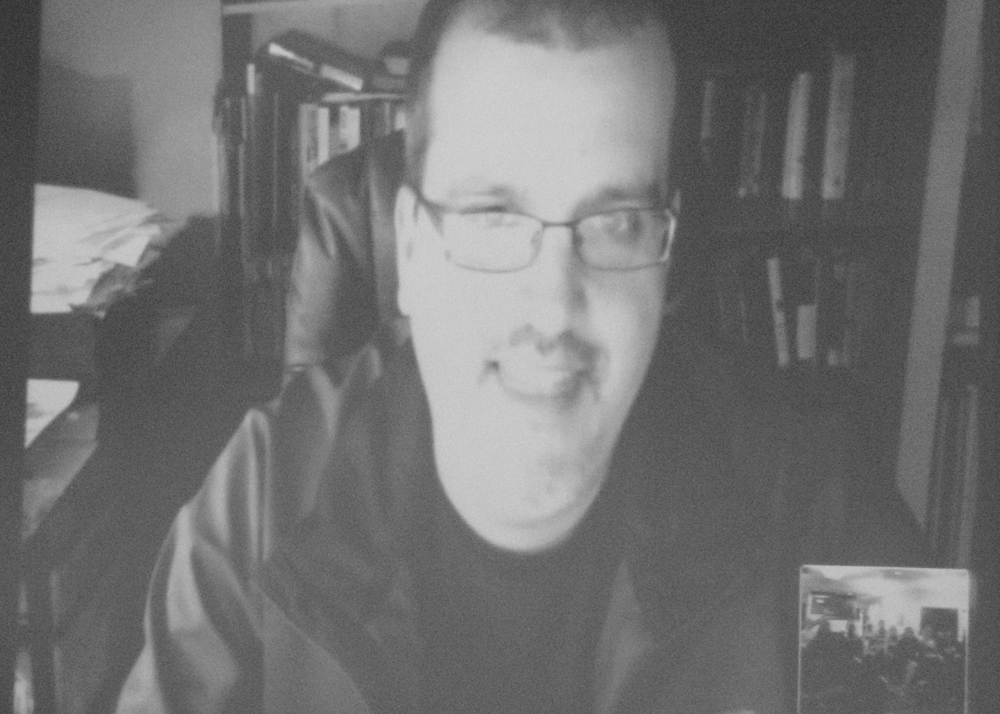
On Jan. 31, students viewed the documentary, narrated by Orlando Bloom, in Corns 312.
The documentary was followed by a Skype session with the founder and director of the film, Lance Trumbull.
The documentary viewing was hosted by Ohio Wesleyan’s Jewish organization, Hillel, and paid for by the Wesleyan Council on Student Affairs (WCSA).
Kushins said Hillel has been trying to get the documentary to campus for two years.
“We’re really excited to finally show it,” she said.
Lance Trumbull started the Everest Peace Project to help unite peoples of different cultures and faiths around the world.
Nine climbers representing different countries and beliefs met in Katmandu to begin preparing for the 60-day climb to the summit of Mt. Everest.
The film shows the power struggle between the climbers such as those from Israel and Palestine who held separate beliefs about what land belonged to the other.
Before the climbers headed for the base camp, a “puja” was performed.
A “puja” is a Buddhist blessing that consists of prayers and the throwing of rice to ensure good luck.
The climbers were assisted by a group of Sherpas who are indigenous to the mountain and known to be the strongest climbers.
“Four percent of people who try to climb Mt. Everest die; it’s the highest mountain in the world,” said Jamie McGuinness, a climber in the film.
Following the viewing of the film, Dr. Kushins was able to set up a group discussion with Trumbull on Skype.
Trumbull began the discussion by explaining his inspiration for completing this climb.
“In 2000 I was going through a difficult time, a divorce, and I wanted to do something radically different. So I sold everything and moved to Katmandu. Then on Oct. 2, 2002 I was on a mountain in India and I had this vision that I was going to create a world peace climb on Mt. Everest.”
Trumbull wanted to show the world that people from different cultures can overcome separate beliefs and do something monumental.
Trumbull jokingly said, “If we could only get our politicians on a mountain top, I think they could suddenly solve a lot of issues.” Students responded well to the documentary. Junior Tammy Winkler said, “What makes it so great is that they have different beliefs, but they have that one common goal.”
Students inquired about the fundraising for such a project.
“Fundraising is not a fun thing, it’s quite difficult. I spent eight years funding this,” said Trumbull.
“I didn’t want the climb to be a profit making thing, but people needed some financial stake, so each climber had to put in $10, 000 of their own money,” said Trumbull.
Trumbull ended the discussion with a final message,
“You have to actively get out there to do things, and make peace. The action of peace makes the world a better place.”
Information about the Everest Peace Project and the upcoming climb on Mt. Kilimanjaro can be found at www.everestpeaceproject.com/.
